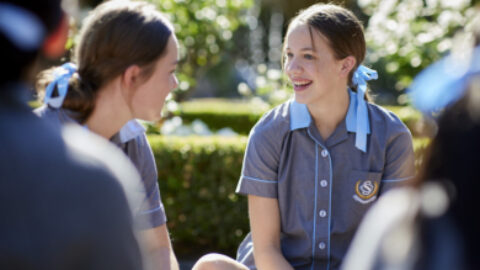weThrive: Parent Resources: Friendships and Relationships

Kindness and inclusion have been the focus of student activities and the student-led assembly in the past week. In recognition of the National Day of Action against Bullying and Violence on 18 March, and Harmony Day on 21 March, groups of Years 8, 10, and 12 students planned assembly presentations and lunchtime activities.
The NDA is Australia’s key bullying prevention initiative, connecting schools and communities to find workable solutions to prevent bullying and promote positive relationships. This year’s theme, ‘Kindness Culture’ was celebrated enthusiastically with a range of activities, including skipping and hopscotch competitions, a Self-Compassion Booth, and kindness and friendship affirmations. Students were also invited to write messages of connection and inclusivity for the Harmony Day ‘Everyone Belongs’ Insta-frame photo activity.
These activities have been a reminder of the importance of developing friendships and connections with others. Learning how to make new friends, and keep them, involves a number of skills every young person needs to understand and develop. For some, these skills will come very naturally, allowing them to easily move between different friendship groups, share their experiences and opening up to new people. For others, this can be much harder to navigate. Belonging to a group that is like-minded, with similar interests, is highly beneficial to a young person’s wellbeing. It gives them a sense of security helping them feel valued, which in turn builds their confidence.
Positive friendships are an important part of the journey to adulthood. Adult carers can support their child or teenager by providing guidance in the many social and emotional skills required for obtaining and retaining healthy relationships.
Featured on St Catherine’s weThrive: Parent Wellbeing Platform this week is our Friendship & Belonging edition. It contains a range of videos offering practical advice for parents to support their young person’s friendships so that they experience a sense of belonging.
Parents are reminded that resources for a range of other topics can be found on the Parent Wellbeing Platform. Following on from my previous article on Managing Overwhelm, you may wish to view the most recent videos and article on the Ukraine Conflict to support your discussions with children and young people.
If you have any concerns about your child, please contact our School Counsellor, your daughter’s class teacher, or Head of Year for further information or seek support.


